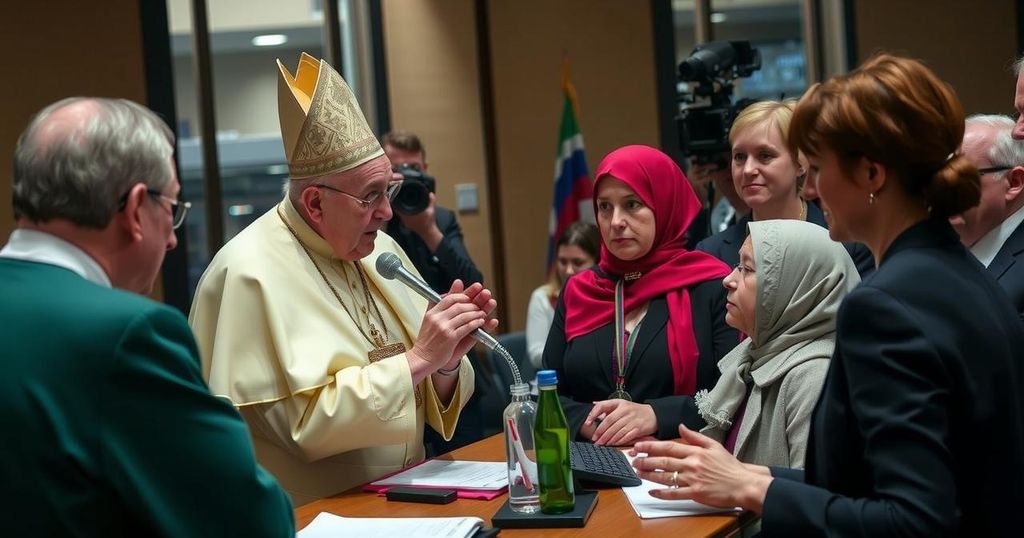COP29 Conflict: Vatican Opposes Women’s Rights Discussions at Climate Summit

The Vatican has caused significant disruption at COP29 by blocking discussions on women’s rights related to climate change. It opposed provisions aimed at supporting women, claiming issues around gender rights could encompass transgender individuals and gay women. This has halted progress on an essential update to the Lima Work Programme on Gender, which aims to empower women facing climate challenges.
A significant conflict has arisen at the COP29 climate summit in Azerbaijan as the Vatican, allied with countries such as Saudi Arabia, Russia, Egypt, and Iran, has obstructed discussions aimed at strengthening women’s rights amid climate change issues. Sources indicate that these nations are insisting on the removal of any references to “gender” and gay women within the proposed legislative measures, causing a deadlock that jeopardizes crucial support for those affected, predominantly women and girls, by climate change. Colombia’s environment minister, Susana Muhamad, lamented the stalling of negotiations and affirmed that Latin American nations remain committed to advancing the gender program and human rights under challenging circumstances.
For over a decade, the global community has recognized the unique challenges women face due to climate change. Despite women and girls representing 80% of individuals displaced by climate disasters, only a negligible portion of climate funding, 0.01%, is allocated to projects that incorporate a gendered perspective. The current discussions seek to update the Lima Work Programme on Gender, a decade-old framework aimed at addressing women’s experiences and needs in climate negotiations. However, the insistence from the Vatican and the aforementioned countries to exclude the term “gender” reflects a broader trend of resistance against enhancing women’s rights and LGBTQ+ rights globally. This has led to concerns about effectively representing diverse experiences of women affected by climate change, which varies based on factors such as gender, sex, age, and race.
In light of this situation, numerous aid charities and gender advocates have raised alarms about the implications of this impasse. The potential expiry of the existing UN gender and climate program leaves a vacuum in international support for women confronting climate crises. The Conference of Parties (COP) summits historically entail significant female representation challenges, as evidenced by the low attendance of women participants in negotiation roles at the current conference. As this environment persists, outcomes that do not genuinely reflect the realities experienced by women from climate-vulnerable regions may be produced, further undermining the objective of integrating gender perspectives in climate action.
The discord at the COP29 climate summit highlights the ongoing tensions surrounding gender rights in international climate negotiations. Historically, the intersection of climate change and gender has gained recognition as women disproportionately endure its effects, primarily due to economic and social factors that hinder their resilience in crises. The Lima Work Programme on Gender aimed to structure explicit support for women affected by climate challenges, acknowledging that they require tailored assistance, especially in light of their caregiving roles. The Vatican’s recent stance, along with its coalition against specific terminology related to gender, brings forth concerns regarding the future of these initiatives and the representation of marginalized groups in climate discussions. This conflict underscores broader societal challenges related to women’s rights and LGBTQ+ recognition amidst fluctuating political landscapes.
In conclusion, the standoff at COP29 creates a precarious situation for women’s rights in the context of climate change. The Vatican’s refusal to endorse discussions that include references to gender and related rights, in alignment with a group of countries similarly resistant to progressive change, jeopardizes essential support mechanisms for women disproportionately affected by climate disasters. As negotiations continue, the outlook for crafting a viable plan that includes robust gender considerations appears grim, spotlighting the need for enhanced representation and commitments to gender equality in climate action.
Original Source: www.bbc.com






